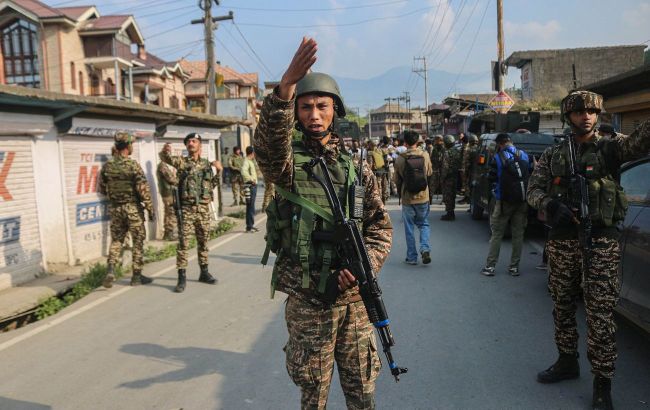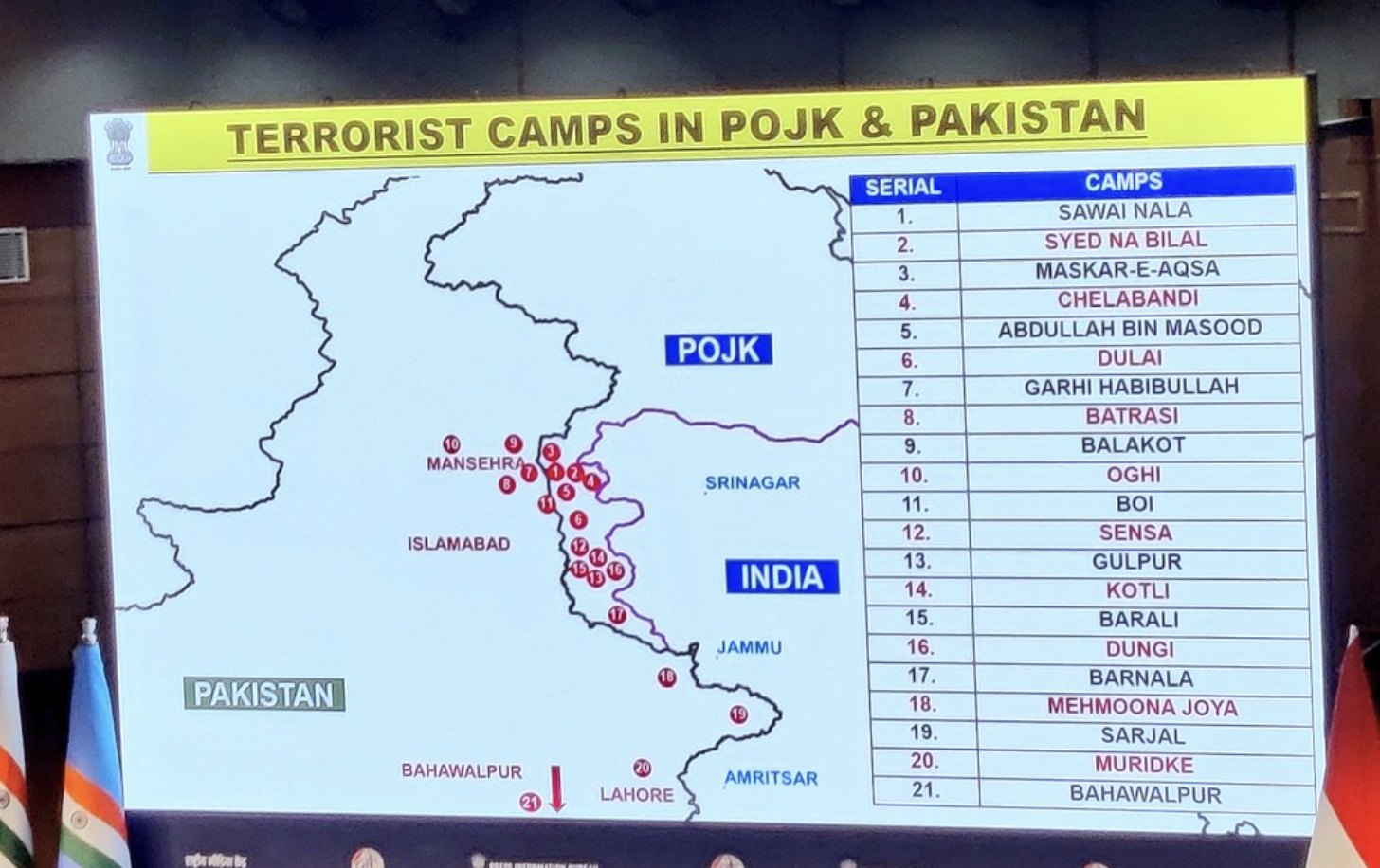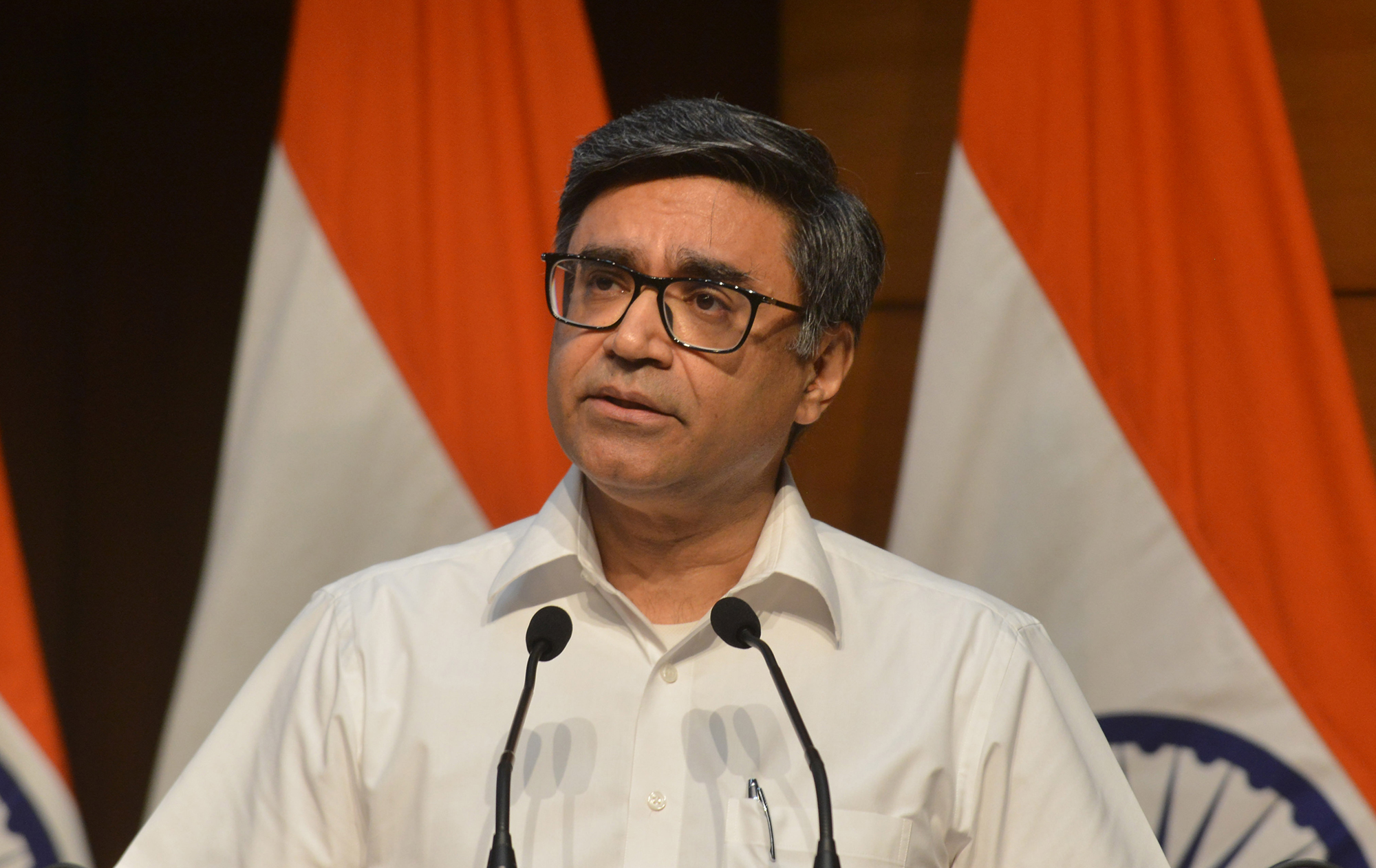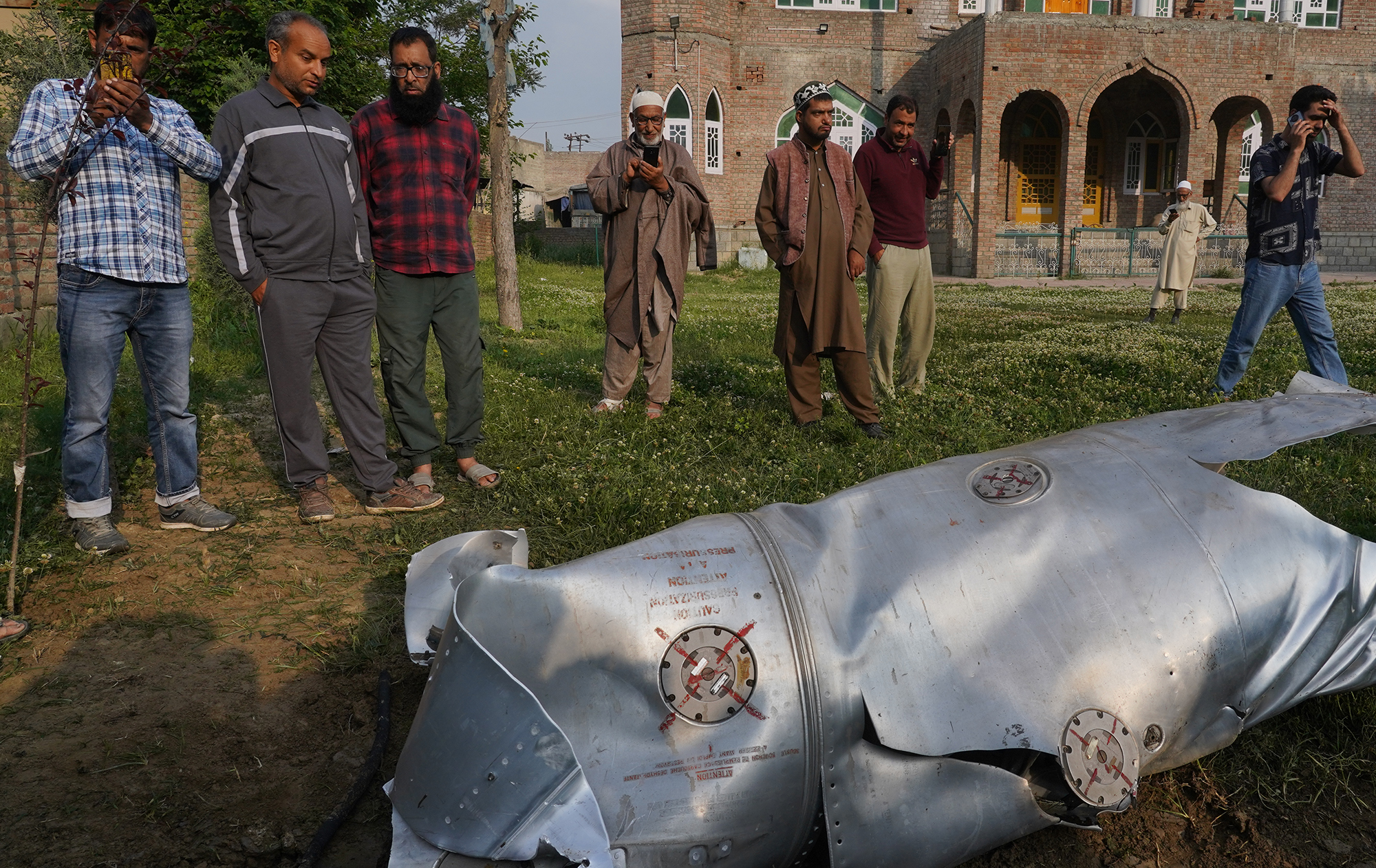India and Pakistan exchange overnight strikes: What happens and how world responds
 Photo: India and Pakistan exchanged missile strikes amid escalation in Kashmir (Getty Images)
Photo: India and Pakistan exchanged missile strikes amid escalation in Kashmir (Getty Images)
On the night of May 7, India announced a military "Operation Sindoor", "hitting terrorist infrastructure in Pakistan and Pakistan-occupied Jammu and Kashmir". Islamabad called it "an act of war" and responded with retaliatory strikes.
Takeaways:
- Why did India launch strikes on Pakistan?
- Could "Operation Sindoor" lead to a full-scale war?
- How did Pakistan respond?
- What do both sides say about casualties?
- How is the world reacting to the new escalation between nuclear powers?
What India says after announcing 'Operation Sindoor'
The Indian side claims it attacked "terrorist" infrastructure in Pakistan, as well as in the Pakistani part of Kashmir. New Delhi reported that 21 targets were hit.
Delhi states that its actions were "precise, restrained, and not aimed at escalation," and asserts that "Pakistani military facilities were not targeted." After the strikes, India's army posted on social media platform X: "Justice has prevailed."
Notably, in the part of Kashmir controlled by India, local authorities ordered the evacuation of citizens from "danger zones" as tensions between New Delhi and Islamabad escalated. These orders came just hours after India launched a series of strikes.
India's Ministry of Foreign Affairs explained that the strikes targeted the “terrorist infrastructure” of the Pakistani group Lashkar-e-Taiba, after Pakistan failed to take action against groups based on its territory that were behind last month's mass killing of tourists in the village of Pahalgam, India (Himalayan region).
The entire "Operation Sindoor" lasted 25 minutes, from 1:05 a.m. to 1:30 a.m. local time, according to Indian Colonel Sophia Qureshi at a Wednesday press conference.
Indian officials, who held a briefing after the operation, presented video footage showing the aftermath of attacks on India over the years, which New Delhi blames on Islamabad. The officials also showed a map and videos, which they claimed depict strikes on "terrorist targets" in Pakistan.
 Photo: strike map from Indian Ministry of Defense briefing (x.com/ANI)
Photo: strike map from Indian Ministry of Defense briefing (x.com/ANI)
In particular, they displayed a map marking the locations of what they claim are several training camps of Lashkar-e-Taiba and Jaish-e-Mohammed in Pakistan's Punjab province.
India's Foreign Minister Vikram Misri explained that Delhi launched "Operation Sindoor" for prevention, as it had received intelligence about threats of new attacks by terrorist groups based in Pakistan.
"India exercised its right to respond to deter such more cross-border terrorism... Our actions were measured and non-escalatory, proportionate, and responsible," Misri stated.
Meanwhile, Indian Prime Minister Narendra Modi has yet to publicly comment on the military operation. However, according to a senior government official cited by CNN, the Prime Minister postponed a trip to Croatia, the Netherlands, and Norway without specifying a reason.
Notably, Modi postponed his international trip just hours after India struck targets on Pakistani territory.
 Photo: India's Foreign Minister Vikram Misri speaking at a press conference in New Delhi following "Operation Sindoor" (Getty Images)
Photo: India's Foreign Minister Vikram Misri speaking at a press conference in New Delhi following "Operation Sindoor" (Getty Images)
How Pakistan responds and what it accuses New Delhi of
Pakistan, in turn, called India's actions "an act of war." The Pakistani government summoned India's chargé d'affaires to the Foreign Ministry, where a protest was lodged over shelling by the Indian army.
Pakistani Prime Minister Shehbaz Sharif wrote on his social media page that Islamabad "has every right to issue a firm response." He added that such a response "has indeed already been delivered." In addition, he convened a meeting of Pakistan's National Security Council.
After India's strike, Pakistan announced the closure of its airspace for 48 hours. However, according to Flightradar, local airports in Karachi and Lahore resumed operations after an 8-hour shutdown. At the same time, aircraft not heading to Pakistan continue to avoid its airspace.
As of the morning of May 7, Pakistan Armed Forces Spokesperson Ahmed Sharif Chaudhry reported that at least 8 people were allegedly killed and another 35 injured as a result of Indian airstrikes. Islamabad accuses India of targeting "exclusively civilians."
#WATCH Video shows multiple hits on the Mundrike and other terrorist camps in Pakistan and PoJK
— ANI (@ANI) May 7, 2025
Col. Sofiya Qureshi says, "No military installation was targeted, and till now there are no reports of civilian casualties in Pakistan." pic.twitter.com/zoESwND7XD
In particular, according to the spokesperson, two mosques were reportedly hit. Pakistan's state TV, citing army data, reported that India had struck three regions of the country. In contrast, Delhi insists it targeted only "known terrorist camps."
Notably, India also reported civilian casualties. According to its claims, 3 civilians were killed by Pakistani forces, who resorted to "indiscriminate" shelling of the contact line.
Union Minister Kiren Rijiju tweets, "#OperationSindoor"
— ANI (@ANI) May 6, 2025
(Video Source: Kiren Rijiju/X) pic.twitter.com/kdBY2xeHqN
Islamabad claims it launched a retaliatory strike on India. The Pakistani government stated that it inflicted "serious losses" on the enemy and that a white flag was raised at one of the Indian army positions. India's Ministry of Defense, on the contrary, spoke of its own successes on the contact line.
Furthermore, the Pakistani side reported strikes on the Indian Army brigade headquarters and a military post located along the contact line in Kashmir. The Indian army has not confirmed these claims.
#WATCH Pinpoint precision targeting by Indian armed forces on Pakistani positions near LoC (exact location not being disclosed)#OperationSindoor pic.twitter.com/eLWGnSluEY
— ANI (@ANI) May 6, 2025
Notably, during the night, Pakistan actively reported the downing of Indian fighter jets, although the numbers varied. By morning, the Pakistani government officially stated that "two enemy aircraft and one UAV" had been shot down, without specifying the types. India has not confirmed any aviation losses.
However, according to Defense Express, wreckage, possibly from one of the aircraft, was found and photographed on the outskirts of Srinagar in Indian Kashmir. The fragments had French inscriptions, which could point to a Rafale or Mirage-2000. However, it is also possible that the photo shows only a discarded external fuel tank.
 Photo: possible wreckage of a downed aircraft found in Kashmir (Getty Images)
Photo: possible wreckage of a downed aircraft found in Kashmir (Getty Images)
According to media reports, fighting is currently ongoing along the contact line in Kashmir itself, where firefights had already been a regular occurrence, but now both sides are using artillery.
At the same time, Pakistan's Defense Minister Khawaja Asif stated that "Islamabad is ready to de-escalate hostilities with India if New Delhi pulls back."
How world reacts
US President Donald Trump responded to India's military operation against Pakistan, calling it "a shame."
"It’s a shame. We just heard about it, just as we were walking in the doors of the Oval, just heard about it. I guess people knew something was going to happen based on a little bit of the past, they've been fighting for a long time, you know, they’ve been fighting for many, many decades and centuries. I just hope it ends very quickly," Trump said.
The US State Department, in turn, called on both India and Pakistan to work with each other to "de-escalate tensions."
China expressed condolences regarding the military action and urged "avoiding actions that could lead to escalation."
UN Secretary-General António Guterres expressed deep concern. He stated that "the world cannot afford a military confrontation between India and Pakistan."
The conflict between India and Pakistan, which has been lasting for several decades, escalated after armed militants opened fire on tourists in the popular village of Pahalgam, India (Himalayan region), on April 22, 2025, killing over two dozen people. New Delhi accuses Islamabad of involvement in the incident, while Pakistan denies the allegations.
Kashmir has been a source of tension between India and Pakistan - and sometimes China - for decades. The region is divided between India and Pakistan, though both countries claim it as their own. The confrontation over Kashmir began in 1947, after India and Pakistan gained independence.
Since then, the two states have fought three full-scale wars, two of which were directly related to Kashmir. India views the region as an integral part of its territory, while Pakistan insists that the Muslim population of the region has the right to self-determination or to join Pakistan.
To find out more about the conflictual relations between India and Pakistan and how Kashmir fits into it, read our material on the topic.
Sources: Press Trust of India, The Times of India, Sky News, Defense Express, Reuters, and CNN.

